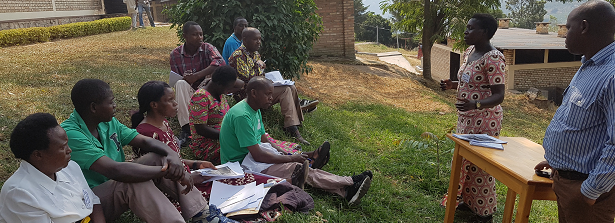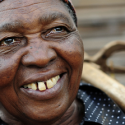Agribusiness-based Advisory Services (ABAS) project, update 02

In September 2017, the main key questions resulting in an analytical framework were formulated for the collaborative learning trajectory “Agribusiness-based Advisory Services”. In the second phase, the team selected 29 cases for the explorative study and discussed the draft findings with core group partners on March 15, 2018.
The Agribusiness-based Advisory Services (ABAS) project is led by a core group of partners consisting of the Royal Tropical Institute (KIT), Moyee Coffee and Agriterra, with the support of the Food & Business Knowledge Platform (F&BKP). The learning trajectory runs from September 2017 until May 2018 and the reference group thinks along in the design of the research, is consulted for their experience and gets informed directly on progress and outcomes. This is the second update of the ABAS project covering October 2017 to March 2018.
Recap of the ABAS analytical framework
During a kick-off workshop early September, partners in the learning trajectory formulated the following key questions for our analytical framework:
- How do companies organize the collection, processing and use of feedback information and data from farmers on their training and other extension services?
- How do companies realize synergy with other agencies in providing advisory services?
- How can longer term sustainability of advisory services be achieved, including mechanisms for cost recovery?
- What are key factors contributing to lower level of adoption by farmers and how can these be addressed?
- What is the development outcome at farmer level of the services provided?
Main activities till date
Following the inception workshop in September 2017 and the development of the study framework the team:
- Undertook a focused desk study on the main questions of the framework;
- Selected out of a longlist with potential cases, 29 cases for the study;
- Undertook skype based interviews with resource persons from close to 20 cases;
- Visited and had detailed follow-up interviews with 8 cases in Kenya and Uganda;
- Provided guidance for a 3 month field study by a MSc student on 7 cases in Kenya, focused on youth engagement in agri-business advisory services;
- Processed all information generated into draft findings for presentation and discussion with core group partners on March 15th, 2018.
Overview of the cases
Out of the 29 businesses and cooperatives that are included as case study in the analysis, 8 cases linked directly to the core partners, 13 cases were included as external cases through interviews, and 8 cases are included based on documentation in a book by IFPRI. Further info on the 29 cases as follows:
Initial interesting findings
Though the processing of all data collected is continuing post core-group workshop it is possible to share just a few initial findings that are emerging, to wet the appetite perhaps:
- Some companies or cooperatives have 1 extension type of staff for every 20 farmers whereas in other cases one staff member serves 1000 farmers or more. What causes the differences?
- The central importance of farmer data collection to support and target the advisory services, the rapid developments in software to handle this and the choices to be made, and the scope to include in this qualitative feedback from farmers on the functioning of the advisory services.
- The relatively limited collaboration with others in the regular provision of advisory services but the well-designed specific forms of collaboration for e.g. development of extension content, capacity building of staff and innovation development and research.
Next steps in the learning trajectory
The following are steps foreseen to conclude this work:
- Preparation and dissemination of an accessible synthesis report with main findings and a 4 page project brief.
- Various web-based communication activities and blogs.
- A presentation and discussion of key findings most in The Hague in June 2018. Reference group members based in the Netherlands will receive an invitation.
A need to continue this initiative?
The initiating group is discussing whether there is a need to give some form of follow-up to this explorative study. The team very much welcomes thoughts on this from professionals in the field. Is it right to note that the topic is of relevance with interest from companies and others concerned? Is there a need for focused forms of capacity building in this area, particularly for the smaller companies or for improving access to experiences and information. Is there a case for continued public co-funding of any of this?
If you would like to join the discussion, then please send an email to Laurens van Veldhuizen, .






